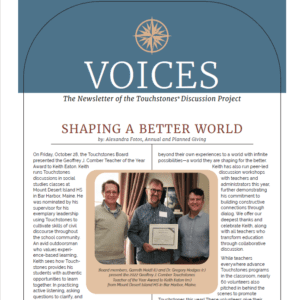By Stefanie Takacs
Transforming any class of students or set of discussion participants into a collaborative group requires serious and consistent effort. This is particularly true in school settings where students aren’t accustomed to expressing their thinking and the reasoning behind those thoughts. But we can’t expect our students to change unless we are willing to be models of change ourselves.
Last week, 16 teachers from Charleston, S.C.’s five public-Montessori schools participated in a Touchstones workshop during a full day of professional development. The group works with students in grades 5-8 and our focus was on socio-emotional learning and adolescence. Together, we looked at a few models of socio-emotional learning and then we engaged in a Touchstones lesson. We put theory into practice, as the teachers focused on their own learning.

At a Montessori mini-conference at James Simons Elementary School in Charleston, SC, teachers and teaching assistants consider which fragment from Heraclitus offers the best wisdom about trust.
As Montessori educators, these teachers strive to support and enrich each student in their classrooms— attending vigilantly to the specific interests demonstrated or intimated by those in their charge. They believe fully in the role of teacher as cultivator of latent abilities and talents and the role of self-discovery and self-teaching in healthy human development.
Reconciling these potentially conflicting approaches to education and measurement of growth requires skill, patience, and faith in both worlds. Emphasizing and evaluating socio-emotional learning within this blended structure is not a simple task. Maturation from childhood into adulthood is slow and rarely captured in a single snapshot of time or data. How then, does one bridge the divide between the most important goals of education—healthy growth across all dimensions of human development—and the desire for content mastery?
In Touchstones, students of all ages learn through regular practice. This practice is not entirely unlike the ways in which students convert factual information into knowledge by connecting new ideas to what they already know. However, the difference in Touchstones is that the discussion process supports student expression and the analysis of opinions and feelings and how one interacts with others. It is not enough to be a skillful speaker; one must also be an excellent listener and leader. These competencies are only acquired with consistent attention and practice.
In these ways, Touchstones reaches far beyond the textual to weave participant experience, emotion, and conceptual understanding into a new fabric shaped by all members of a group. In the construction of this fabric, all members of a class— teachers included—examine what they think and why. They find the freedom to augment and exchange inherited assumptions and presuppositions for thinking that is informed by multiple perspectives, more accurate self-perception, and deeper self-knowledge.
Touchstones thanks the leadership of the Charleston Public School District Montessori program for the invitation to work with their teachers. The district offers a model worth considering, as we look for educational approaches that nurture the whole child and prepare all youth for successful and healthy lives.



 Join the
Join the